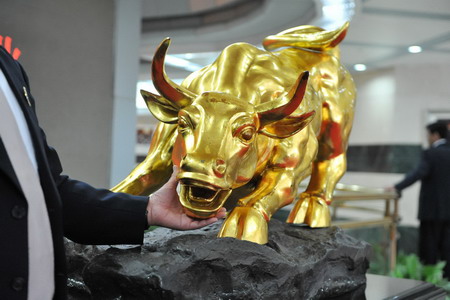Markets
Share dumps may put spoke in growth board's big wheels
By Bai Ping (China Daily)
Updated: 2010-09-30 11:29
 |
Large Medium Small |
|
 |
|
A participant at an IPO at the Shenzhen Stock Exchange touches a golden bull before the launch of three IPOs at the ChiNext market. [Xu Ruiping / For China Daily] |
BEIJING - As China's Nasdaq-style second board approaches its first anniversary next month, the market has been gripped by growing anxiety over rumored imminent share dumps by insiders and former executives.
Since the growth enterprise board (GEB) started trading last October in Shenzhen, 18 senior managers from 16 listed start-ups have resigned, bringing with them shares worth a whopping 1.45 billion yuan ($216 million), Chinese media reports say.
The companies have cited personal reasons, including family reunions or health conditions, for their departures. But media and financial analysts now warn of massive sell-outs as they suspect the entrepreneurs are preparing to cash out as soon as their lockup agreements expire.
The board's rules disallow executives from selling their holding within 12 months of their company's initial public offerings. However, the lockup period shortens to half a year if a manager resigns. Market analysts say the restrictions explain why the resignations had "peaked" in March and April, about half a year before the lockup agreements end.
The temptation to cash out while share prices are still high is obvious. Wei Yi and Nie Pengxiang, both vice-presidents of the GEB-listed Center Testing International, were paid yearly salaries of 194,000 yuan and 473,000 yuan before they quit in June. They'll soon be able to sell their shares, now valued at about 11.6 million yuan for Wei and 9.5 million yuan for Nie. Media reports say that to get around the lockup restriction for management, senior executives in several GEB companies have given up their titles to take non-managerial positions.
People in the West may argue there is nothing wrong if an entrepreneur decides to collect his share of profits early rather than wait until the later stages of his company. Venture capitalists usually sell shares shortly after, if not at the time of the IPO.
But critics of China's GEB don't think so. They believe the exodus of the senior managers is just another proof the market, designed to be a financing platform for innovative companies, is scuttling rather than encouraging Chinese entrepreneurship.
Liu Jipeng, a capital markets specialist at the China University of Political Science and Law, said that GEB-listed companies are usually oversubscribed with soaring share prices, because a too-stringent process had made them "rarities", a situation where too much money was chasing too few listings.
| ||||
GEB was meant to spur finance-starved innovative start-ups with strong growth potential. However, if a GEB-listed company found itself flush with raised capital that yielded profits more easily than growing a new business, why would it continue to be entrepreneurial, was Liu's take on his blog.
Judging by the companies' pampered situation and the resignation of the senior executives, Liu believes the Chinese entrepreneurial zeal is dying rather than flourishing after the tide of IPOs on the GEB.
There is also growing talk of business ethics now that the insiders are exiting their businesses. When former managers rush to profit from their stocks, it may come as a double whammy to small investors. The excess supply can put severe downward pressure on the prices, and share dumps by insiders may weaken people's confidence in the long-term potential of the company.
Since the mid-term financial reports were made public, stock analysts have raised doubts about the growth sustainability of some of the more than 100 GEB-listed companies and suspected several were the works of spin-doctors. So their founders are eager to cash out before people begin to question their business models.
Chinese financial commentator Pi Haizhou once predicted that the biggest problem for the GEB would be regulation. "The regulatory efforts should be 100 times as intense as those on the main board; otherwise any company on the GEB could be a time bomb. Investors should not pay for the de-listing of a company," he said.
In fact, people may even now be hearing the bomb ticking as they anticipate a spate of speculative volatility triggered by insiders' share sales.



